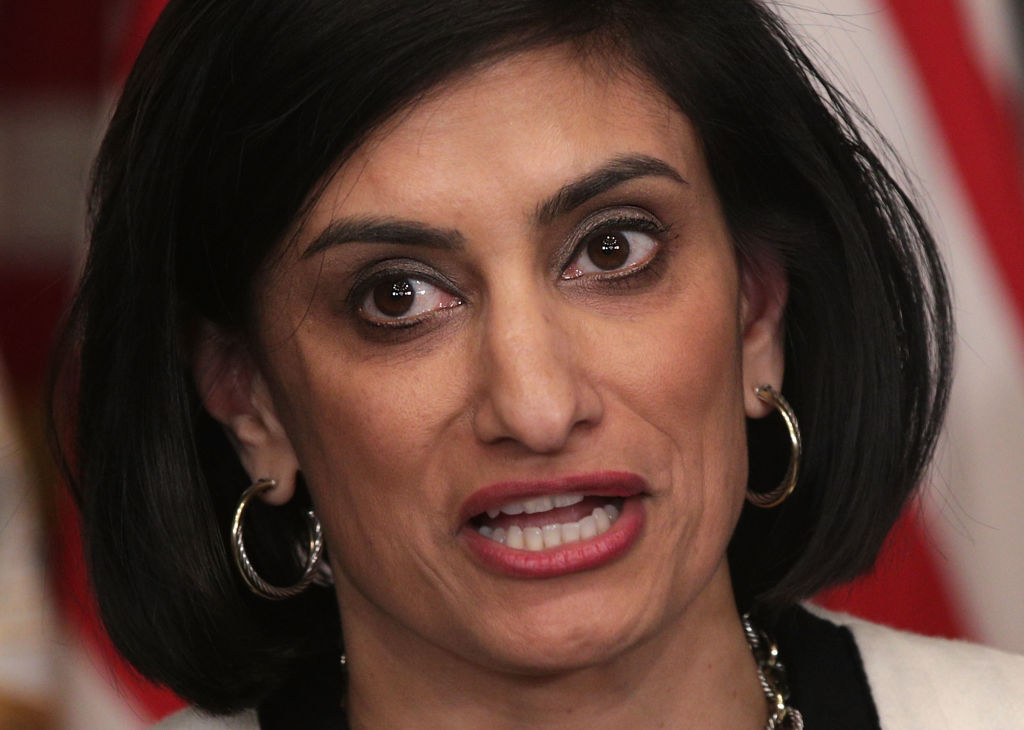[UPDATE: This story was updated at 9:18 p.m. PT to include additional comments from experts and officials.]
The Trump administration early Thursday initiated a pivotal change in the Medicaid program, announcing that for the first time the federal government will allow states to test work requirements as a condition for coverage.
The announcement came in a 10-page memo with detailed directions about how states can reshape the federal-state health program for low-income people.
The document details who should be excluded from the new work requirements — including children and people being treated for opioid abuse — and offers suggestions as to what counts as “work.” Besides employment, it can include job training, volunteering or caring for a close relative.
Seema Verma, the administrator of the Centers for Medicare & Medicaid Services (CMS), said the policy change is an effort to give states more flexibility. She told reporters in a call Thursday that it could lead to a decline in Medicaid enrollment.
“We see moving people off Medicaid as a good outcome because that means they do not need the program anymore and have transitioned to a job or can afford insurance,” she said. “This policy helps people achieve the American dream.”
CMS officials said they did not have any estimates on how much Medicaid enrollment would drop as a result of the policy.
Adding a work requirement to Medicaid would mark one of the biggest changes to the program since its inception in 1966. It is likely to prompt a lawsuit from patient advocacy groups, which claim the requirement is inconsistent with Medicaid’s objectives and would require an act of Congress.
Republicans have been pushing for the change since the Affordable Care Act added millions of “able-bodied” adults to Medicaid. It allowed states to provide coverage to anyone earning up to 138 percent of the federal poverty level (about $16,600 for an individual).
The Obama administration turned down several state requests to add a work requirement.
Ten states have applied for a federal waiver to add a work requirement — Arizona, Arkansas, Indiana, Kansas, Kentucky, Maine, New Hampshire, North Carolina, Utah and Wisconsin. Officials in several other states have said they are interested in the idea.
An HHS official, who spoke on the condition of anonymity because the official had not been authorized to discuss the developments, said the agency may approve Kentucky’s request as early as Friday. Gov. Matt Bevin, a Republican, first sought to add such a provision in 2016. The current request would require able-bodied adults without dependents to work at least 20 hours a week.
Kentucky, which has some of the poorest counties in the country, has seen its Medicaid enrollment double in the past three years after the state expanded eligibility under the ACA.
While more than 74 million people are enrolled in Medicaid, only a small fraction would be affected by the work requirement. That’s because children — who make up nearly half of Medicaid enrollees — are excluded. So are the more than 10 million people on Medicaid because they have a disability.
More than 4 in 10 adults with Medicaid coverage already work full time, and most others either go to school, take care of a relative or are too sick to work.
Still, critics fear a work requirement could have a chilling effect on people signing up for Medicaid or make it harder for people to get coverage.
Jane Perkins, legal director for the National Health Law Program, a patient advocacy group, said a lawsuit is likely once CMS approves a state waiver.
“We believe that the work requirement is indeed a problem because it is not consistent with Medicaid’s objectives” to furnish medical assistance, she said. “Programs that assist people in finding and keeping work are effective, not programs that penalize them by stopping health insurance or blocking them from getting health coverage in the first place.”
But work requirements have strong public backing. About 70 percent of Americans say they support states imposing a work requirement on non-disabled adults, according to a Kaiser Family Foundation poll last year. (Kaiser Health News is an editorially independent program of the foundation.)
The Trump administration, along with many Republican leaders in Congress, has long supported such a move. The failed efforts in the House to replace Obamacare included a work requirement for Medicaid.
In its guidance to states, CMS said they should consider how some communities have high unemployment rates and whether enrollees need to care for young children or elderly relatives.
CMS also advised states to make work requirements for Medicaid similar than those used with food stamps to “reduce the burden on both states and beneficiaries.”
(Story continues below.)
“This new guidance paves the way for states to demonstrate how their ideas will improve the health of Medicaid beneficiaries, as well as potentially improve their economic well-being,” Brian Neale, CMS deputy administrator and director for the Center for Medicaid and CHIP Services, said in the press release.
Verma, who has said she doesn’t think Medicaid should become a way of life for people who are not disabled, said the new guidance shows how the administration is trying to give states more flexibility in running Medicaid.
“Our policy guidance was in response to states that asked us for the flexibility they need to improve their programs and to help people in achieving greater well-being and self-sufficiency,” she said.
Verma, who worked with Kentucky and Indiana on their work requirement waivers as a health consultant before joining the Trump administration, recused herself from the decision on those states’ waiver requests.
Jennifer Walthall, secretary of the Indiana Family and Social Services Administration, applauded the new CMS guidance and said she expects the state’s work requirement request to be approved “in the coming days.”
“Whether it is a job, training, volunteering, substance abuse treatment, additional education or another opportunity, becoming an active and productive member of the community is an important part of healthy living,” she said in a statement.


